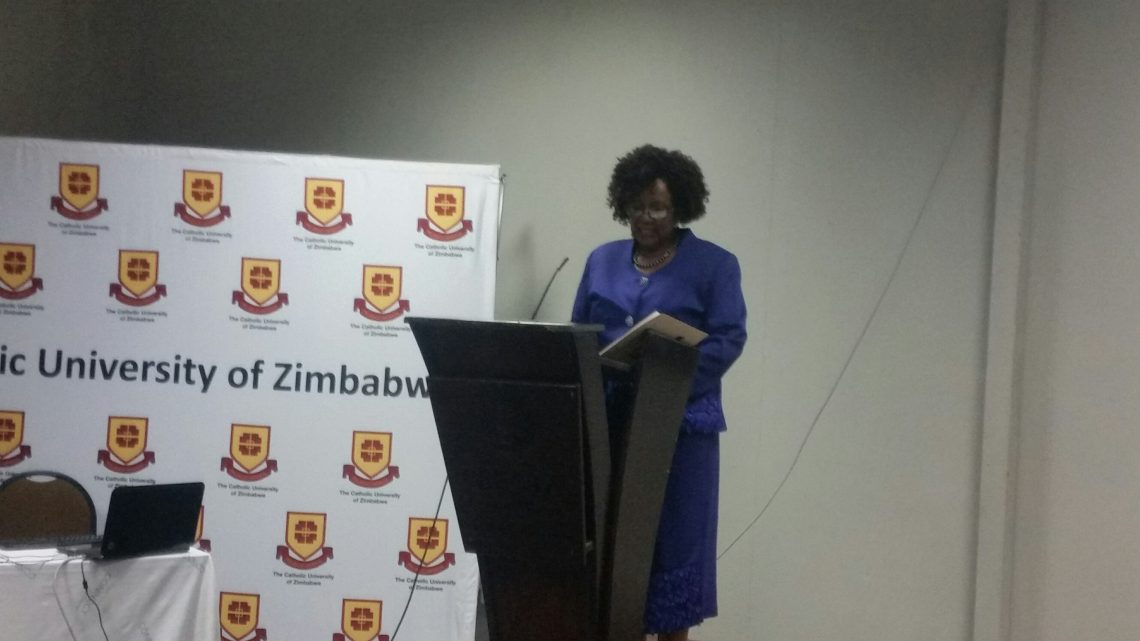By Byron Mutingwende
Migration should be looked at through the lens of the common good and not as a problem since it is a tool for development.
That appeared at the international conference on migration that was organised by the Catholic University of Zimbabwe and held in Harare from the 27th of February to the 1st of March 2018. Priscah Mupfumira, the minister of tourism and hospitality industry, graced the launch.
The conference sought to provide accurate information, as well as an ethical perspective on the current migration crisis with special emphasis on development in the Southern African region; strengthen the unity of different actors on migration issues and development; explore effective responses to the migration crisis that will contribute to employment creation, sustainable development and social cohesion while respecting cultural and religious diversity; and examine the drivers of forced migration including conflicts, climate change, unemployment and failure of governance, with a view to correcting or mitigating them.
Speaking about contemporary challenges on migration and development in Africa, Dr. David Kaulem, a Lecturer at Arrupe College said the major challenge of migration is how people understand it.
“If the world and our environment are part of the Common Good, then migrating is a natural and wonderful human resource for dealing with the demands for development and for fulfilling the mission of the Church in Africa. If we re-imagine the nation state and down grade its importance (sovereignty), we may appreciate more how we have created crimes and demons out of migration,” Dr. Kaulem said..
He said development is the comprehensive and integrated growth of all beings and all of God’s creation. Every individual creature must be allowed to grow in all its dimensions. For humans, it means every individual should grow physically, socially, psychologically, morally, spiritually, historically and in all other dimensions.
Integral development demands that space, institutions, systems, virtues and environments be cultivated to allow its fulfilment.
“The challenge is that when each individual grows, it also must become part of the context within which all other creatures grow to their own fruition. Integral development means that the growth of one must entail the growth of its own kind and of others. If human beings flourish, other creatures must also flourish.”
On the other hand, enlarging human choices is building human capacities, building the range of things that people can do or be, leading a long and healthy life, being educated, having access to resources needed for a decent life, participating in the life of one’s community and being free – able to participate in making the rules and institutions that govern them.
Christopher Mweembe, the National Coordinator of Caritas Zimbabwe gave interesting statistics on migration. It emerged that as of 2015, there were more than 250 million international migrants globally. Women constituted 48%; an estimated one-third being migrants under the age of 30; with 150 million being migrant workers; and 21.3 million as refugees (ILO 2015; UNDESA 2016). In 2013, 23.2 million people emigrated from Sub Saharan Africa to other regions. The top 10 emigration countries were Somalia; Burkina Faso; Sudan; the Democratic Republic of Congo; Nigeria; Côte d’Ivoire; Zimbabwe; Mali; South Africa and South Sudan.
Mweembe said there are various reasons why people leave their countries of origin. The include poverty, harsh living conditions, deteriorating political and socio-economic conditions, increasing youth and women unemployment, armed conflicts, threats to peace and security, violation of fundamental rights, natural disasters, climate change and famine.
Pull factors are the conditions that attract migrants to their desired destinations. These include better economic opportunities, more jobs, and the promise of a better life that often pull people towards a new country.
“Another positive aspect of migration are the remittances. The term remittances refers to resources in cash or kind sent by people to family members or friends back home to assist them in meeting daily needs (food, school fees, funerals, home maintenance, etc.). They are domestic if sent by family members within a country (e.g. those in towns) and international when sent by family members living outside the country.
“Most of the remittances in Sub-Saharan Africa are for consumption and social security purposes. This underlines the poverty and social insecurity situations existing in this region. A reduction in poverty would certainly ensure that more funds are used for development, as is the case in other regions like Latin America and Caribbean where 74 % of the remittances are used for development purposes,” Mweembe said.
The church also plays a critical role in migration and development. It provides pastoral care, psychosocial support and safeguarding migrants (welcome, respect, protection, promotion and genuine love of every person).
“Over the years, the church has been providing basic social services like shelter, food and clothes. Thus it acts as a caring mother. It has also been conducting migration research (policy reviews and analysis) and development through its academic institutions and other arms of the church to inform policy. The church engages in national advocacy, campaigns and capacity building processes and has the watch dog role to government on how it is implementing its policies,” Mweembe said.
Esther Kirimi, the United Nations High Commission for Refugees (UNHCR) Zimbabwe representative (legal department) said there is a plethora of challenges in refugee protection.
These include the disjointed State-by-State response as opposed to cooperative ones; politicisation of refugee issues; burdened refugee host countries/communities; protracted refugee situation (no durable solution) and protracted conflicts and little political will or solidarity to deal with root causes of displacement.
